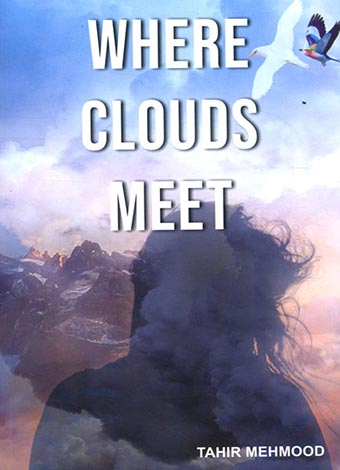
Author: Tahir Mehmood
Publisher: Ferozsons (Pvt) Limited.
Pages: 255
Price: Rs. 795

After his first book of short stories — A Lone Long Walk — which was published in 2020, Tahir Mehmood’s debut novel, Where Clouds Meet recently hit the stands. The ‘Clouds’ is spread over a vast canvas, depicting conflict, war, romance, and political, historical, ideological and philosophical discussions as well as a wholesome taste of fantasy and bestiary.
If Mehmood’s short stories remain a celebration of “life, love and duty,” in this novel the author has also attempted to expand on the same themes by weaving together apparently two different stories in two separate settings, leading towards the same objective and conclusion — rejoicing freedom and independence of spirit.
The novel metaphorically conjoins the realism of life, love, courage and toils of a soldier’s tale with the story of a free-spirited fantasy bird, “Tutu Titu,” whose curiosity brings him from the vast, rugged mountainous region to the chaotic, crowded world of human beings — in bird-language “Homingos” — in the plains.
The stories of the soldier and the bird — the realism and the fantasy — run parallel — echoing the same messages, never converging, yet supplementing one another. As in life, often seesawing between the two, making it sometimes just bearable, at others, lifting it to new heights.
“Love is not a flower that sprouts on the soil of convenience and logic. Love is a wild spring that travels in remote lands of dreams and desires with no care for fear of winning or losing …” the opening pages of the novel set the tone for romance with lines like these, and introduce the main and secondary characters in short strokes. As the novel progresses, these characters are fleshed out through their actions, words, debates, arguments and the questions they raise.
Tahir Mahmood — one of the latest and welcome additions to the fast-expanding list of Pakistan’s English-language authors — is different in spirit, style, content and message from many of his predecessors and contemporaries.
Unlike many other ‘Desi’ English-language writers, Tahir Mehmood does not look at Pakistan from the traditional Eurocentric Liberal point-of-view, or from alien eyes. He does not judge Pakistan and its various facets applying the borrowed yardstick of the West. He just introduces and explains them with understanding, offering a local, indigenous perspective.
This, however, does not mean that his writing offers a conservative worldview or remains propagandist in the name of nationalism, the call of duty and sacrifice — as many would want to believe, and because the author’s worldview is different from the traditional English-medium elite writers of Pakistan. No, not at all. His views are modern, but not western. They are rooted in, and inspired by Pakistan. And it is understandable. Tahir Mehmood had served as a Pakistan Army officer for nearly three decades, retiring from the position of Brigadier in just October this year. But while in service, he did not carry the affix of Brigadier while publishing his writings — whether articles, short-stories or poems or serving as the chief editor of Pakistan’s Armed Forces’ magazine Hilal. He has tried to keep his military life separate from his writing endeavours, though in both these roles, Pakistan and its narrative appear close to his heart.
However, Brig. (Retired) Tahir Mehmood is not just a mere man of words. He has seen plenty of action during his military service — from Kargil to Kashmir and from Bosnia to Afghanistan. And his hard-earned experience, sometime at the peril of his life, is reflected in his writing — not just where in the novel he describes the scenes of war, but also while portraying the majesty, the magnificence and the beauty of mountains, the valleys, the vastness of the sky, the hilly tracks, and the serenity of lakes, underlining his closeness to, and love of nature.
Captain Ali, the protagonist of the novel, is not just a routine military guy, but a traveller, a loner and nature-lover, who on his motorbike keeps exploring and revisiting the mountain regions, valleys and lakes. His soulmate, Serena Haq, is a modern, outgoing, independent anti-war girl, who in the initial phase of their relationship questions Capt. Ali; “But how can you fire and kill a living being who has a family, and a whole life to spend?”
Capt. Ali has his justification: “I have seen enemy soldiers firing at my soldiers. I have also seen enemy soldiers targeting the innocent populace of Neelum Valley. I can never forget when enemy soldiers hit a bus full of civilian passengers … What options does one have except to fire back …?”
The scenes of war described in the book could only have been written by a soldier, having first-hand knowledge and experience of the life and death matters in a combat zone. These scenes make for a powerful, fascinating and interesting read and add to the experience of the reader who can almost taste the war, experience the action, and feel the adrenaline rush while sitting in a cosy armchair in his bedroom.
All the main characters of the novel in one way or another are either directly involved in the conflict or have suffered the brunt of it. If Capt. Ali’s adventures give readers a glimpse of the Kashmir and Kargil conflicts, Serena Haq is a direct victim of the war in Afghanistan during the days of its Soviet occupation. Her father is a missing person who could not return to his American wife and infant daughter as he got sucked into the Afghan turmoil —the fate of many Pakistani tribesmen, who lived near the Pak-Afghan border. The love story of Serena’s parents in New York against the backdrop of the Afghan War is as touching as that of their daughter’s bonding with Capt. Ali. If the story of one generation encapsulates the Afghan conflict, generation next carries the burden of the simmering Kashmir dispute.
The story of the East Pakistan debacle is unveiled through another interesting character, Professor Nawaz Karim Khan, a Bihari who has a first-person account of the tragedy. The arguments, debates, discussions and polemics between the characters are as interesting as the pages packed with action. And they explain both, life’s challenges as well as putting in context the various conflicts that have besieged the main characters.
And as the tale of humans unfolds, there is the engrossing story of the fantasy bird Tutu Titu which runs parallel to that, telling the reader about his endeavours to understand the “Homingos,” seek knowledge and attain freedom.
The way the author describes the first flight of Tutu Titu, how he masters the art of backflap, how he fights the much bigger bird of prey, his capture, love in captivity and the eventual flight to freedom make an interesting read both for the young and the old, and could also be a stand-alone take. The author’s description of the flight of the bird and the fight scenes it is involved in, underline his keen observation and knowledge of nature. Tutu Titu is both, philosophical and symbolic.
“A dream gets transformed into a challenging ambition when one has made all preparations to achieve it … A desire devoid of sincere and sustained struggle is a ghost that haunts the bosom which breeds and nurtures it … Madness metamorphosing into a single point of focus is a ‘constructive madness’ that can move mountains and change the course of oceans.
”Where Clouds Meet does not just offer the readers of English-language Pakistani fiction a different genre of literature, but is a very welcome addition.

The writer is a senior journalist and managing editor, Narratives.



